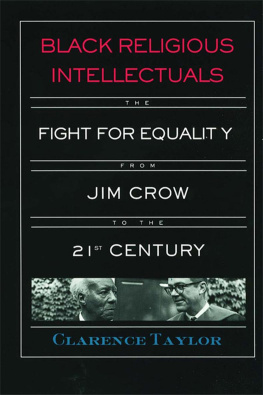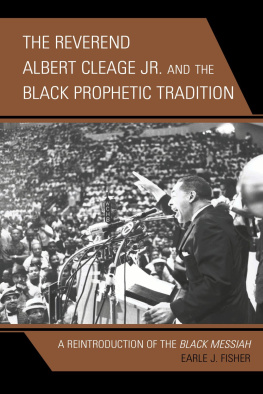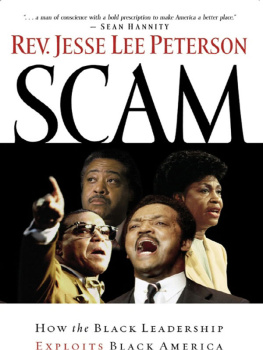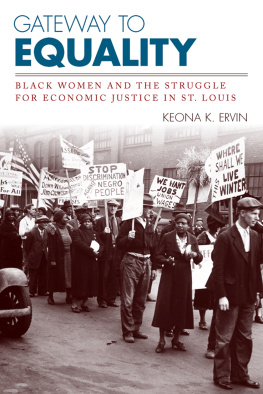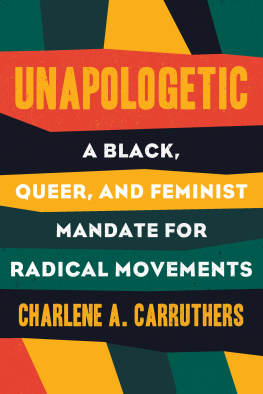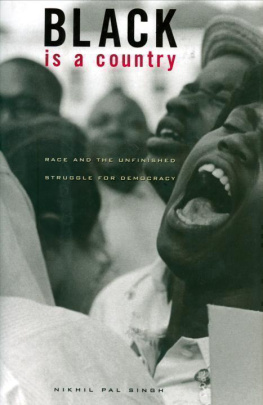BLACK RELIGIOUS INTELLECTUALS
Crosscurrents in African American History
Graham Russell Hodges and Margaret Washington, Series Editors
Writings on Black Women of the Diaspora: History, Language, and Identity
By Lean'tin L. Bracks
The Slaves of Liberty: Freedom in Amite Country, Mississippi, 18201868
By Dale Edwyna Smith
Black Conservatism: Essays in Intellectual and Political History
Edited by Peter Eisenstadt
Moving On: Black Loyalists in the Afro-Atlantic World
Edited by John W. Pulis
Afro-Virginian History and Culture
Edited by John Saillant
Unyielding Spirits: Black Women and Slavery in Early Canada and Jamaica
By Maureen G. Elgersman
Historical Roots of the Urban Crisis: African Americans in the Industrial City, 19001950
Edited by Henry Louis Taylor, Jr. and Walter Hill
Gender in the Civil Rights Movement
Edited by Sharon Monteith and Peter J. Ling
Hitler's Black Victims: The Historical Experiences of Afro-Germans, European Blacks, Africans, and African Americans in the Nazi Era
By Clarence Lusane
Contested Terrain: African American Women Migrate from the South to Cincinnati, Ohio, 19001950
By Beverly Bunch-Lyons
Black Religious Intellectuals: The Fight for Equality from Jim Crow to the Twenty-first Century
By Clarence Taylor
Rebels, Reformers, and Revolutionaries: Collected Essays and Second Thoughts
By Douglas R. Egerton
Invisible Others / Active Pretences in the U.S. Black Community
Edited by Jean Muteba Rahier and Percy Hintzen
BLACK RELIGIOUS
INTELLECTUALS
THE FIGHT FOR EQUALITY
FROM JIM CROW
TO THE
TWENTY-FIRST CENTURY
C LARENCE T AYLOR
For Marsha, Jason, Tara, and Amanda
Published in 2002 by
Routledge
270 Madison Ave,
New York NY 10016
www.routledge-ny.com
Published in Great Britain by
Routledge
2 Park Square, Milton Park,
Abingdon, Oxon, OX14 4RN
www.routledge.co.uk
Routledge is an imprint of the Taylor & Francis Group.
Transferred to Digital Printing 2010
Copyright 2002 by Routledge
All rights reserved. No part of this book may be reprinted or reproduced or utilized in any form or by any electronic, mechanical, or other means, now known or hereafter invented, including photocopying and recording, or in any information storage or retrieval system, without permission in writing from the publishers.
Library of Congress Cataloging-in-Publication Data
Taylor, Clarence.
Black religious intellectuals : the fight for equality from Jim Crow to the 21st century / Clarence Taylor.
p. cm. (Crosscurrents in African American history)
Includes bibliographical references and index.
ISBN 0-415-93326-9 (alk. paper)ISBN 0-415-93327-7 (pbk. : alk. paper)
1. African American clergyBiography. 2. African American intellectualsBiography. 3. African American leadership. 4. African American clergyPolitical activity. 5. African AmericansCivil rights. 6. African AmericansReligion. I. Title. II. Series.
BR563 .N4 T383 2002
200 .92396073dc21
2002002622
Contents
Introduction. Black Intellectuals:
A More Inclusive Perspective
1 Sticking to the Ship:
Manhood, Fraternity, and the Religious World View of A. Philip Randolph
2 Expanding the Boundaries of Politics:
The Various Voices of the Black Religious Community of Brooklyn, New York, before and during the Cold War
3 The Pentecostal Preacher as Public Intellectual and Activist:
The Extraordinary Leadership of Bishop Smallwood Williams
6 A Natural-Born Leader:
The Politics of the Reverend Al Sharpton
7 The Evolving Spiritual and Political Leadership of Louis Farrakhan:
From Allah's Masculine Warrior to Ecumenical Sage
Acknowledgments
Truth be told, I had no intention of writing a book on black religious intellectuals. But due to the inquiry of many of my students at Florida International University on the role of black religious intellectuals, I decided to write this work. This book is due, in large part, to the inquisitive minds and probing questions of my undergraduate and graduate students. I owe a great debt to my close friend Jonathan Birnbaum for his careful editing of the entire text and for discussing many of the ideas of this book. Because of his help this is a much better book. I would also like to thank the School of Arts and Sciences at Florida International University, in particular Dean Art Herriot and Dean Ivelaw Griffith, who served as associate Dean of Arts and Sciences until very recently, for their financial support of this project.
I would like to thank Graham Hodges for his encouragement and his urging that I submit my manuscript to Routledge. I owe many thanks to Richard Gringeri for reading, commenting on several chapters, and helping with their conceptualization. Richard's keen mind and generosity helped me shape this book. I would also like to thank Scott Delany for reading, commenting on chapters, providing me with a lot of material, and spending a great deal of time just talking about the work. I would like to thank my colleague Dan Cohen for his very thoughtful comments and careful editing of . I owe a great debt to Devon Wright and Chanelle Rose for assisting me in researching and for sharing their findings on Culmer and Gibson. I would like thank Ralph Ginzburg, Azim Thomas, and Yvonne Williams for allowing me use the wonderful photographs in this book.
My brother, the Reverend Lawrence Taylor, also assisted in discussing and educating me on theology. I owe a thanks to Carol Berkin, Judith Stein, and the wonderful group of graduate students at the City University of New York for allowing me to present my chapter on Smallwood Williams and providing me with a great many helpful comments. Likewise, the comments I received from Felice Lipshitz, James Sweet, Valerie Paterson, and Mary Levitt were extremely helpful.
Last but not least, I would like to thank Marsha for her unconditional love and support. I cannot express in words what she has done to help me with this work.
BLACK RELIGIOUS INTELLECTUALS
I NTRODUCTION
Black Intellectuals
A More Inclusive Perspective
Black religious leaders have played a central role in the intellectual life of the United States. The following essays examine representatives of this important tradition which has shaped not only intellectual history, but also the general history of the United States.
The popular image of black religious leadership is usually represented by examples of the charismatic male leader. This book studies well-known examples such as Al Sharpton and Louis Farrakhan and less well-known ministers such as Smallwood Williams and Theodore Gibson. The image of the charismatic male leader raises two important questions. First, what are the tactical limitations and strengths of such leadership? And second, is such a leadership a sufficient definition of what has been or should be black religious leadership? Chapters on A. Philip Randolph, Smallwood Williams, and Ella Baker and Pauli Murray suggest the need for a much wider definition of black religious leadership.
A brief survey of the social science literature demonstrates that black religious leaders are rarely studied for their intellectual contributions. With the exception of Martin Luther King Jr., Malcolm X, and a few icons of the American civil rights and black power movements, there has been a general tendency among scholars writing on black intellectuals in the twentieth century to ignore the black religious community. The people in this important community have had a rich heritage of intellectual discourse and fervent politics throughout its history and have been at the center of the struggle for social equality in America.

